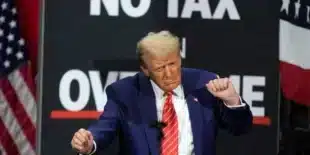U.S. Treasury Secretary Janet Yellen is embarking on a visit to China, aiming to navigate through the complexities of the U.S.-China relationship without sparking an open conflict, despite existing challenges in the world’s two largest economies’ rivalry. These challenges include disputes over China’s subsidies for electric vehicles and solar panels manufacturing, mirroring the U.S. government’s increasing support for these sectors. Additional points of contention involve trade issues, TikTok ownership, access to semiconductor technology, and national security concerns, all of which pose risks to a delicately balanced bilateral relationship.
Yellen, a distinguished economist and former head of the Federal Reserve, will discuss these topics with Chinese finance officials and state leaders during her five-day journey to Guangzhou and Beijing. Her agenda includes meetings with high-ranking Chinese officials such as Vice Premier He Lifeng and Central Bank Governor Pan Gongsheng, as well as engagements with American business leaders in China, university students, and local officials.
The Treasury Secretary’s trip is part of ongoing diplomatic efforts initiated during a meeting between President Joe Biden and Chinese President Xi Jinping in Indonesia in 2022. It marks Yellen’s third meeting with China’s vice premier and comes after Biden and Xi’s recent phone call aimed at maintaining direct communication between the two leaders, covering issues like Taiwan, artificial intelligence, and security.
Yellen has voiced concerns over China’s impact on the global market, particularly in the green energy sector, accusing it of undercutting international efforts by flooding the market with subsidized products. She plans to express these concerns during her visit, emphasizing the need for fair competition and addressing the potential overcapacity caused by China’s substantial investments in certain industries.
The dialogue occurs amidst heightened tensions, with Xi inviting American CEOs to invest in China and Biden scrutinizing U.S. investments in Chinese high-tech manufacturing. Despite these challenges, experts suggest that the current ‘managed rivalry’ could prevent more severe consequences for the bilateral relationship.
Yellen’s visit also highlights the broader context of U.S.-China economic interactions, including the longstanding issue of China’s role in the global economy and its impact on U.S. manufacturing jobs. Yet, some analysts see a silver lining in the competition over green products, suggesting that subsidy wars could benefit consumers by making climate-friendly products more accessible.
This trip, set against the backdrop of an election year filled with heightened rhetoric on China, aims to continue the dialogue started during Yellen’s previous visit in July, which led to the creation of economic working groups to ease tensions and strengthen ties. However, it unfolds at a time when U.S.-China relations are scrutinized for various reasons, including trade, espionage, and China’s stance on Russia’s actions in Ukraine. Despite these issues, Yellen emphasized the importance of maintaining a robust trading relationship with China, underlining the mutual dependence of the two economic giants.


